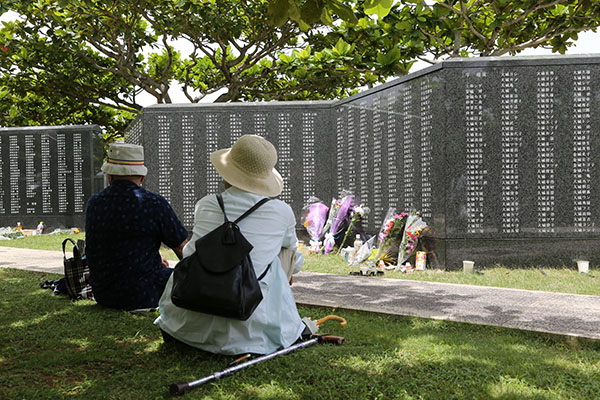Scars spur battle over Okinawa's 'war relics'
By Cai Hong and Shan Yi in Tokyo (China Daily) Updated: 2015-08-12 07:44
 |
|
Okinawans pay homage to their relatives killed in the Battle of Okinawa in 1945 on June 23, 2015. Photo by Cai Hong / China Daily |
'A hard life'
Some farmers who lost their land were compelled to move as far away as Bolivia, looking for places for permanent residence, or to work in odd jobs, according to former Okinawan governor Masahide Ota.
"I visited those Okinawan emigrants living in Bolivia. They lived a hard life there, reclaiming the barren hills for farming. They called themselves 'pariahs'," Ota said.
In 1972, Okinawans finally got what they had long sought when Okinawa prefecture was returned to Japanese control.
While the Okinawans did not harbor any illusions that the bases would be eliminated altogether, they did expect that the burden would be reduced and at least made comparable to that shared by the mainland.
But they soon learned that the US bases would remain intact. Okinawa became the military linchpin in the US strategy of Cold War containment in the Asia-Pacific region.
Many Okinawans were embarrassed when, for the first time, they asked their compatriots in other parts of Japan to share some, if not all, of their burden, Naomi Jahana, on the editorial board of the Naha-based Okinawa Times, recalled.
"We did not have the heart to transfer our suffering to others. But we were enraged after learning that the rest of Japan refused to house US bases," Jahana said.
She argued that if US military bases were essential to Japan's security, the burden should be shared equally among the country's other 46 prefectures, and Tokyo should afford Okinawa the same treatment it accords other prefectures.
The relocation of the Futenma base to Nago has caused a flare-up of the confrontation between Okinawa and the Japanese government. Located in the center of Ginowan, Futenma puts at risk 100,000 citizens who live around it.
In 1996, Tokyo and Washington reached an agreement to relocate Futenma within Okinawa. It was only in 2012, after Abe pledged to inject 300 billion yen ($2.4 billion) into the Okinawan economy each year until 2021, that then-Okinawa governor Hirokazu Nakaima sanctioned the landfill project for the base construction in Henoko. This move cost Nakaima his job.
Local election results underscore the anti-base sentiment. In November, anti-base campaigner Takeshi Onaga won the election for governor in a landslide victory. In the Nago mayoral election in January, Susumu Inamine won with a vow to oppose the base relocation.
Contrary to belief, many Okinawans say, the local economy is not dependent upon the base. The prefectural government in Okinawa argues that the US bases are a disincentive for growth. Studies found that revenue related to the US military presence declined from 15.5 percent of the local economy in 1972 to 5.3 percent in 2008. Tourism, on the other hand, has developed quickly.
Per capita income in Okinawa has always been the lowest among Japan's 47 prefectures, and its jobless rate has been the nation's highest for years.
Tokyo and Washington put forward many arguments in defense of Okinawa's bases.
Washington believes its location - Tokyo, Taipei, Shanghai, Seoul, Pyongyang and Beijing are all within a 2,000-km radius - makes Okinawa the "cornerstone of peace and stability in East Asia". Tokyo similarly sees Okinawa's role as crucial for the Japan-US alliance and believes that transferring these bases off the prefecture would strip Japan of its deterrent.
The Japanese government has stressed this point further under the pretext of a rising China being a threat to Japan.
However, many Okinawans don't buy these claims.
Hiroshi Ashitomi said that Okinawa is a peace-loving place and that the US presence has ruined its image. The US sent its soldiers from the island to battlefields in Vietnam, Iraq and Afghanistan.




